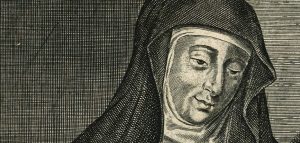
Part Two: Hildegard of Bingen
Part Two: Hildegard of Bingen shows Philippa “the liberating power of Christianity for women”
St Hildegard also taught Dr Martyr about the joy and service of being an unmarried woman consecrated to God.
“Hildegard is and should be a Catholic feminist icon – but only if we can recapture the truly Catholic feminist idea of women who lived as unmarried, chaste, in union with the Church, with consecrated bodies, as radically counter-cultural icons of the Kingdom of God.”
She says debates about gender could benefit from consideration of how Christianity has advocated for the rights of women throughout the centuries.
“One of the revolutionary things about Christianity was that it liberated women of all classes, not just the rich,” Dr Martyr said.
“They were freed from the obligation to enter contractual and often loveless marriages for dynastic purposes (and early death in childbirth), and given an actual choice – a real choice – pretty much for the first time in history.”
“The Protestant Reformation sought to ‘liberate’ consecrated women by marrying them off, when actually they were freer and had more opportunities for education and authority as celibate women.”
Another element of Hildegard’s intellectual renown is in philology for her creation of one of the earliest constructed languages, the Lingua Ignota, a secret language, which may have been for the purpose of solidarity and confidentiality among women religious or mystical inspiration.
“Compared to what came beforehand, Christianity was hugely liberating for women, and I can’t stress enough that I mean women of all classes – it was truly egalitarian.”
Today, the decline of marriage in society can overshadow the priority of religious life, of which Hildegard’s work was a shining example of prayer, intellectual work and charity.
“Thing is, marriage isn’t the most important sacrament in the Church. The Mass, the Eucharist, the Blessed Sacrament is the great sacrament that binds us all together, and everyone can access this and feed off God Himself,” Dr Martyr said.
“Hildegard knew this; she fed off God, wrote music to Him; healed in His name; ate, slept, breathed, suffered, prayed, loved and lived with Him every day of her life. We can all do this, whether we’re married or single.”
Hildegard’s philosophy understood all of the cosmos as musical, including Heaven, which contains music so beautiful that it is impossible to describe.
Dr Martyr hopes the discourse regarding feminism in the Church can transcend conflict between men and women to focus instead on the incredible contribution consecrated religious life makes to the Church.
“It might be helpful if we stopped seeing Hildegard in terms of men in the Church versus women in the Church, and started seeing things more in terms of the Church’s real need for monasticism and religious life; consecrated life,” Dr Martyr said.
“People living the consecrated life in the Church are like its lungs – they breathe in all the badness, and purify it by their lives, and breathe out goodness and grace back into the Church. Or like earthworms – no one sees them, but under the soil they’re hard at work, digesting all the awfulness, and enriching the soil, and breaking it up, so that the earth can flourish and be really productive. The Church desperately needs generous souls like this, and always will.”
“I also love Hildegard because she may have suffered from migraines, like I do! Oliver Sacks in his book Migraine describes Hildegarde and her visions, based on drawings of these visions which seem to show she experienced visual scotoma, along with the spiritual insights she received,” Dr Martyr said.
“I love that God works with our fallen bodies in this way – that someone can have spiritual insights and experiences, but also physical illness and suffering, and the two can co-exist and work together to benefit others.”
Hildegard of Bingen, a great saint and intellect of the Church, was an ordinary woman and also extraordinary in her abandonment to God’s plans for her.
Despite her prominence and magnitude of work, “she still had the humility to describe herself as a ‘feather on the breath of God’, flying not on her own strength, but only because the air of God bore her along.”
Source: Catholic Outlook
